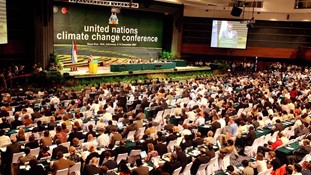No veil of uncertainty at COP26, please!
25 May 2021|
- Research

The anthropogenic greenhouse gas (GHG) emissions remain in the atmosphere for hundreds of thousands of years. You may know that scientists predict that an average global temperature increase of about 1.5 degrees over the present level can trigger the melting of the Greenland icecap – half the ice would melt in the first 1,000 years, with all melting after 3,000 years. In the meanwhile, we will lose the Antarctic ice sheet too. In only a few years from now, these triggers will cause irreversible disruption and destabilisation of the ecosystem on the Earth, and it can cause a premature extinction of humans and many other species living on the planet.

The Tragedy of Global Cooperation
To combat global warming, curbing GHG emissions (known as climate-change mitigation) is currently the primary policy on the agenda. It is a global problem, and contribution to any climate-change mitigation is a public-good provision that no one can be excluded from its benefits. To reduce the scope of free riding, the countries have been trying to form climate coalitions. Examples of such coalitions are the Montreal Climate Coalition, the Kyoto Protocol, and the Paris Agreement. But with the absence of any supranational organisation in climate negotiations, cooperation on climate change mitigation has been a difficult task. It is more than three decades since climate negotiations started, and unfortunately, the failure of countries in climate cooperation has been the biggest planetary tragedy. This year the UK will host the 26th UN Climate Change Conference of the Parties (COP26) in Glasgow, and the scientists are warning that with no doubt, we should not lose any opportunity in achieving the goals of the Paris Agreement.
Climate Uncertainty
By joining climate coalitions, the countries set their climate mitigation policies cooperatively. But the climate problems are subject to various types of uncertainty, among which uncertainty about the social benefit of mitigation (equivalently, about the social cost of climate damages) has been an essential variable in climate policies because the uncertainties around it affect states’ decision-making in joining climate coalitions.
Veil of Uncertainty
Among economists working on the International Environmental Agreements, only a few authors have investigated the role of uncertainties on the formation of climate coalitions. A robust and counter-intuitive result in the literature predicts that the higher the average (expected) social benefit of mitigation (or social cost of damages), the smaller the size of the climate coalition. This is known as the ‘small-coalition paradox’! And so, the literature concludes that learning about the high social benefit is likely not to be conducive for the formation of larger climate coalitions. Thus, they recommend the ‘veil of uncertainty’ in climate negotiations to keep the policymakers uninformed about it.
Resolving the Small-Coalition Paradox
In a paper, which is currently under revision for the Journal of the Association of Environmental and Resource Economists, I show that this paradox is due to a game-theoretic solution concept used in the literature. It is not a general result. Let me explain this a bit more. We model the strategic interaction of countries in game-theoretic settings, and we adopt certain rules as solution concepts to predict the outcome of their interactions. The solution concept that is used in the literature relies on the assumption that in decision-making about joining/leaving a climate coalition, a country is, myopically, concerned about its own gains/losses, ignoring others’ reactions.
But why should we ignore the possibility of retaliation upon breaking off climate negotiations? Why should we assume that other countries will be passive if a country considers leaving or joining a climate coalition? I suggest using a more generalised solution concept known as Farsightedness. Farsightedness means ‘predicting’ the final outcome of coalition formation, while myopic policymakers are only concerned about the immediate consequences of their actions. Farsightedness means upon leaving or joining a climate coalition, a country/group should anticipate if the remaining countries unravel (unilaterally or multilaterally) or merge.
Changing the solution concept can change the perditions of climate coalition-formation dramatically. For example, if there are 195 countries in the World, and if the average social benefit of mitigation (or social cost of damage) is sufficiently high, then with farsighted states, I predict that a grand coalition of 195 counties or a coalition of 194 countries can form. In comparison, the solution concept that is dominant in the literature predicts a coalition of only two countries forms! Thus, by using a more generalised solution concept, I resolve the small-coalition paradox.
Get Policymakers Onboard
Therefore, learning about the high social benefits (or damage costs) does not dissuade the formation of larger climate coalitions, and actually, the opposite is true. So, the recommendation of the veil of uncertainty is not a general result. This suggests that if the scientific research indicates a high level of social benefit from mitigation (or a high level of climate damage), we should say that as loud as possible at COP26!
Category: Research